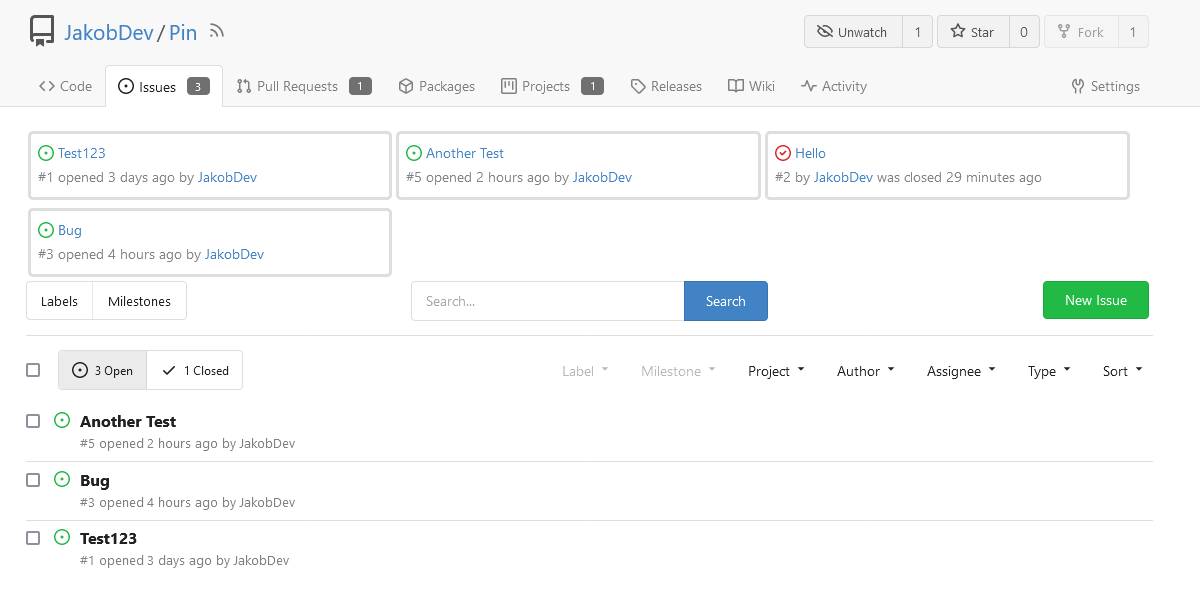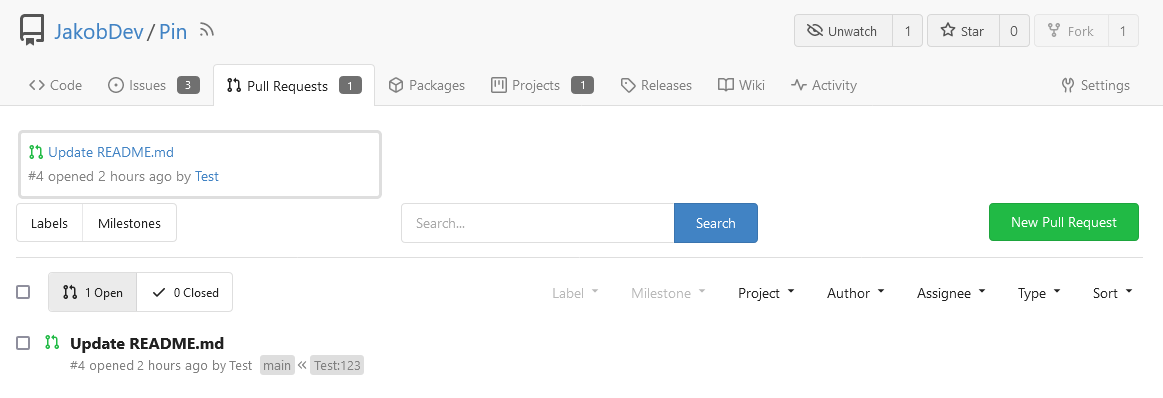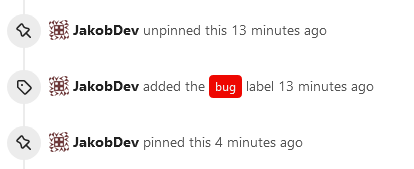mirror of
https://codeberg.org/forgejo/forgejo.git
synced 2025-01-26 21:06:39 +03:00
This adds the ability to pin important Issues and Pull Requests. You can also move pinned Issues around to change their Position. Resolves #2175. ## Screenshots    The Design was mostly copied from the Projects Board. ## Implementation This uses a new `pin_order` Column in the `issue` table. If the value is set to 0, the Issue is not pinned. If it's set to a bigger value, the value is the Position. 1 means it's the first pinned Issue, 2 means it's the second one etc. This is dived into Issues and Pull requests for each Repo. ## TODO - [x] You can currently pin as many Issues as you want. Maybe we should add a Limit, which is configurable. GitHub uses 3, but I prefer 6, as this is better for bigger Projects, but I'm open for suggestions. - [x] Pin and Unpin events need to be added to the Issue history. - [x] Tests - [x] Migration **The feature itself is currently fully working, so tester who may find weird edge cases are very welcome!** --------- Co-authored-by: silverwind <me@silverwind.io> Co-authored-by: Giteabot <teabot@gitea.io>
263 lines
7.1 KiB
Go
263 lines
7.1 KiB
Go
// Copyright 2020 The Gitea Authors. All rights reserved.
|
|
// SPDX-License-Identifier: MIT
|
|
|
|
package convert
|
|
|
|
import (
|
|
"context"
|
|
"fmt"
|
|
"net/url"
|
|
"strings"
|
|
|
|
"code.gitea.io/gitea/models/db"
|
|
issues_model "code.gitea.io/gitea/models/issues"
|
|
repo_model "code.gitea.io/gitea/models/repo"
|
|
user_model "code.gitea.io/gitea/models/user"
|
|
"code.gitea.io/gitea/modules/label"
|
|
"code.gitea.io/gitea/modules/log"
|
|
"code.gitea.io/gitea/modules/setting"
|
|
api "code.gitea.io/gitea/modules/structs"
|
|
)
|
|
|
|
// ToAPIIssue converts an Issue to API format
|
|
// it assumes some fields assigned with values:
|
|
// Required - Poster, Labels,
|
|
// Optional - Milestone, Assignee, PullRequest
|
|
func ToAPIIssue(ctx context.Context, issue *issues_model.Issue) *api.Issue {
|
|
if err := issue.LoadLabels(ctx); err != nil {
|
|
return &api.Issue{}
|
|
}
|
|
if err := issue.LoadPoster(ctx); err != nil {
|
|
return &api.Issue{}
|
|
}
|
|
if err := issue.LoadRepo(ctx); err != nil {
|
|
return &api.Issue{}
|
|
}
|
|
|
|
apiIssue := &api.Issue{
|
|
ID: issue.ID,
|
|
Index: issue.Index,
|
|
Poster: ToUser(ctx, issue.Poster, nil),
|
|
Title: issue.Title,
|
|
Body: issue.Content,
|
|
Attachments: ToAttachments(issue.Attachments),
|
|
Ref: issue.Ref,
|
|
State: issue.State(),
|
|
IsLocked: issue.IsLocked,
|
|
Comments: issue.NumComments,
|
|
Created: issue.CreatedUnix.AsTime(),
|
|
Updated: issue.UpdatedUnix.AsTime(),
|
|
PinOrder: issue.PinOrder,
|
|
}
|
|
|
|
if issue.Repo != nil {
|
|
if err := issue.Repo.LoadOwner(ctx); err != nil {
|
|
return &api.Issue{}
|
|
}
|
|
apiIssue.URL = issue.APIURL()
|
|
apiIssue.HTMLURL = issue.HTMLURL()
|
|
apiIssue.Labels = ToLabelList(issue.Labels, issue.Repo, issue.Repo.Owner)
|
|
apiIssue.Repo = &api.RepositoryMeta{
|
|
ID: issue.Repo.ID,
|
|
Name: issue.Repo.Name,
|
|
Owner: issue.Repo.OwnerName,
|
|
FullName: issue.Repo.FullName(),
|
|
}
|
|
}
|
|
|
|
if issue.ClosedUnix != 0 {
|
|
apiIssue.Closed = issue.ClosedUnix.AsTimePtr()
|
|
}
|
|
|
|
if err := issue.LoadMilestone(ctx); err != nil {
|
|
return &api.Issue{}
|
|
}
|
|
if issue.Milestone != nil {
|
|
apiIssue.Milestone = ToAPIMilestone(issue.Milestone)
|
|
}
|
|
|
|
if err := issue.LoadAssignees(ctx); err != nil {
|
|
return &api.Issue{}
|
|
}
|
|
if len(issue.Assignees) > 0 {
|
|
for _, assignee := range issue.Assignees {
|
|
apiIssue.Assignees = append(apiIssue.Assignees, ToUser(ctx, assignee, nil))
|
|
}
|
|
apiIssue.Assignee = ToUser(ctx, issue.Assignees[0], nil) // For compatibility, we're keeping the first assignee as `apiIssue.Assignee`
|
|
}
|
|
if issue.IsPull {
|
|
if err := issue.LoadPullRequest(ctx); err != nil {
|
|
return &api.Issue{}
|
|
}
|
|
if issue.PullRequest != nil {
|
|
apiIssue.PullRequest = &api.PullRequestMeta{
|
|
HasMerged: issue.PullRequest.HasMerged,
|
|
}
|
|
if issue.PullRequest.HasMerged {
|
|
apiIssue.PullRequest.Merged = issue.PullRequest.MergedUnix.AsTimePtr()
|
|
}
|
|
}
|
|
}
|
|
if issue.DeadlineUnix != 0 {
|
|
apiIssue.Deadline = issue.DeadlineUnix.AsTimePtr()
|
|
}
|
|
|
|
return apiIssue
|
|
}
|
|
|
|
// ToAPIIssueList converts an IssueList to API format
|
|
func ToAPIIssueList(ctx context.Context, il issues_model.IssueList) []*api.Issue {
|
|
result := make([]*api.Issue, len(il))
|
|
for i := range il {
|
|
result[i] = ToAPIIssue(ctx, il[i])
|
|
}
|
|
return result
|
|
}
|
|
|
|
// ToTrackedTime converts TrackedTime to API format
|
|
func ToTrackedTime(ctx context.Context, t *issues_model.TrackedTime) (apiT *api.TrackedTime) {
|
|
apiT = &api.TrackedTime{
|
|
ID: t.ID,
|
|
IssueID: t.IssueID,
|
|
UserID: t.UserID,
|
|
Time: t.Time,
|
|
Created: t.Created,
|
|
}
|
|
if t.Issue != nil {
|
|
apiT.Issue = ToAPIIssue(ctx, t.Issue)
|
|
}
|
|
if t.User != nil {
|
|
apiT.UserName = t.User.Name
|
|
}
|
|
return apiT
|
|
}
|
|
|
|
// ToStopWatches convert Stopwatch list to api.StopWatches
|
|
func ToStopWatches(sws []*issues_model.Stopwatch) (api.StopWatches, error) {
|
|
result := api.StopWatches(make([]api.StopWatch, 0, len(sws)))
|
|
|
|
issueCache := make(map[int64]*issues_model.Issue)
|
|
repoCache := make(map[int64]*repo_model.Repository)
|
|
var (
|
|
issue *issues_model.Issue
|
|
repo *repo_model.Repository
|
|
ok bool
|
|
err error
|
|
)
|
|
|
|
for _, sw := range sws {
|
|
issue, ok = issueCache[sw.IssueID]
|
|
if !ok {
|
|
issue, err = issues_model.GetIssueByID(db.DefaultContext, sw.IssueID)
|
|
if err != nil {
|
|
return nil, err
|
|
}
|
|
}
|
|
repo, ok = repoCache[issue.RepoID]
|
|
if !ok {
|
|
repo, err = repo_model.GetRepositoryByID(db.DefaultContext, issue.RepoID)
|
|
if err != nil {
|
|
return nil, err
|
|
}
|
|
}
|
|
|
|
result = append(result, api.StopWatch{
|
|
Created: sw.CreatedUnix.AsTime(),
|
|
Seconds: sw.Seconds(),
|
|
Duration: sw.Duration(),
|
|
IssueIndex: issue.Index,
|
|
IssueTitle: issue.Title,
|
|
RepoOwnerName: repo.OwnerName,
|
|
RepoName: repo.Name,
|
|
})
|
|
}
|
|
return result, nil
|
|
}
|
|
|
|
// ToTrackedTimeList converts TrackedTimeList to API format
|
|
func ToTrackedTimeList(ctx context.Context, tl issues_model.TrackedTimeList) api.TrackedTimeList {
|
|
result := make([]*api.TrackedTime, 0, len(tl))
|
|
for _, t := range tl {
|
|
result = append(result, ToTrackedTime(ctx, t))
|
|
}
|
|
return result
|
|
}
|
|
|
|
// ToLabel converts Label to API format
|
|
func ToLabel(label *issues_model.Label, repo *repo_model.Repository, org *user_model.User) *api.Label {
|
|
result := &api.Label{
|
|
ID: label.ID,
|
|
Name: label.Name,
|
|
Exclusive: label.Exclusive,
|
|
Color: strings.TrimLeft(label.Color, "#"),
|
|
Description: label.Description,
|
|
}
|
|
|
|
// calculate URL
|
|
if label.BelongsToRepo() && repo != nil {
|
|
if repo != nil {
|
|
result.URL = fmt.Sprintf("%s/labels/%d", repo.APIURL(), label.ID)
|
|
} else {
|
|
log.Error("ToLabel did not get repo to calculate url for label with id '%d'", label.ID)
|
|
}
|
|
} else { // BelongsToOrg
|
|
if org != nil {
|
|
result.URL = fmt.Sprintf("%sapi/v1/orgs/%s/labels/%d", setting.AppURL, url.PathEscape(org.Name), label.ID)
|
|
} else {
|
|
log.Error("ToLabel did not get org to calculate url for label with id '%d'", label.ID)
|
|
}
|
|
}
|
|
|
|
return result
|
|
}
|
|
|
|
// ToLabelList converts list of Label to API format
|
|
func ToLabelList(labels []*issues_model.Label, repo *repo_model.Repository, org *user_model.User) []*api.Label {
|
|
result := make([]*api.Label, len(labels))
|
|
for i := range labels {
|
|
result[i] = ToLabel(labels[i], repo, org)
|
|
}
|
|
return result
|
|
}
|
|
|
|
// ToAPIMilestone converts Milestone into API Format
|
|
func ToAPIMilestone(m *issues_model.Milestone) *api.Milestone {
|
|
apiMilestone := &api.Milestone{
|
|
ID: m.ID,
|
|
State: m.State(),
|
|
Title: m.Name,
|
|
Description: m.Content,
|
|
OpenIssues: m.NumOpenIssues,
|
|
ClosedIssues: m.NumClosedIssues,
|
|
Created: m.CreatedUnix.AsTime(),
|
|
Updated: m.UpdatedUnix.AsTimePtr(),
|
|
}
|
|
if m.IsClosed {
|
|
apiMilestone.Closed = m.ClosedDateUnix.AsTimePtr()
|
|
}
|
|
if m.DeadlineUnix.Year() < 9999 {
|
|
apiMilestone.Deadline = m.DeadlineUnix.AsTimePtr()
|
|
}
|
|
return apiMilestone
|
|
}
|
|
|
|
// ToLabelTemplate converts Label to API format
|
|
func ToLabelTemplate(label *label.Label) *api.LabelTemplate {
|
|
result := &api.LabelTemplate{
|
|
Name: label.Name,
|
|
Exclusive: label.Exclusive,
|
|
Color: strings.TrimLeft(label.Color, "#"),
|
|
Description: label.Description,
|
|
}
|
|
|
|
return result
|
|
}
|
|
|
|
// ToLabelTemplateList converts list of Label to API format
|
|
func ToLabelTemplateList(labels []*label.Label) []*api.LabelTemplate {
|
|
result := make([]*api.LabelTemplate, len(labels))
|
|
for i := range labels {
|
|
result[i] = ToLabelTemplate(labels[i])
|
|
}
|
|
return result
|
|
}
|